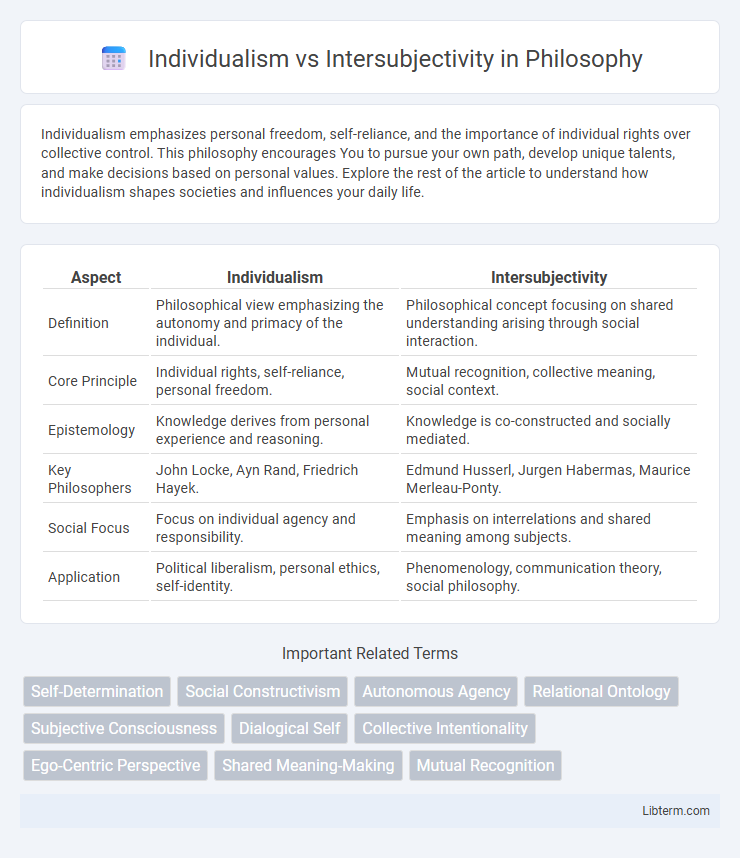Individualism emphasizes personal freedom, self-reliance, and the importance of individual rights over collective control. This philosophy encourages You to pursue your own path, develop unique talents, and make decisions based on personal values. Explore the rest of the article to understand how individualism shapes societies and influences your daily life.
Table of Comparison
| Aspect | Individualism | Intersubjectivity |
|---|---|---|
| Definition | Philosophical view emphasizing the autonomy and primacy of the individual. | Philosophical concept focusing on shared understanding arising through social interaction. |
| Core Principle | Individual rights, self-reliance, personal freedom. | Mutual recognition, collective meaning, social context. |
| Epistemology | Knowledge derives from personal experience and reasoning. | Knowledge is co-constructed and socially mediated. |
| Key Philosophers | John Locke, Ayn Rand, Friedrich Hayek. | Edmund Husserl, Jurgen Habermas, Maurice Merleau-Ponty. |
| Social Focus | Focus on individual agency and responsibility. | Emphasis on interrelations and shared meaning among subjects. |
| Application | Political liberalism, personal ethics, self-identity. | Phenomenology, communication theory, social philosophy. |
Understanding Individualism: Core Concepts
Individualism emphasizes the autonomy and self-reliance of the individual as the fundamental unit of society, prioritizing personal freedom, rights, and independence. Core concepts include the belief that individuals are self-contained agents capable of making rational decisions and pursuing their unique goals without external interference. This perspective contrasts with intersubjectivity, which highlights shared meanings and collective understanding arising through social interactions.
Defining Intersubjectivity: Meaning and Scope
Intersubjectivity refers to the shared understanding and mutual recognition between individuals within a social context, emphasizing the co-construction of meaning through communication and interaction. Unlike individualism, which prioritizes personal autonomy and self-interest, intersubjectivity highlights the dynamic interplay of perspectives that shape social reality. This concept spans disciplines such as philosophy, psychology, and sociology, underscoring the essential role of relational processes in human cognition and experience.
Historical Perspectives on Individualism and Intersubjectivity
Historical perspectives on individualism trace back to Renaissance humanism, which emphasized personal autonomy and self-expression, shaping modern Western thought. Intersubjectivity, rooted in phenomenology and social philosophy, highlights the shared, mutual understanding constructed between individuals through communication and social interaction. The evolving dialogue between these concepts reveals a shift from prioritizing isolated selfhood toward recognizing the foundational role of collective meaning and relational contexts in shaping individual identity.
Psychological Foundations: Selfhood and Shared Experiences
Individualism centers on the psychological foundation of selfhood, emphasizing personal identity, autonomy, and internal cognition shaped through subjective experiences. Intersubjectivity highlights shared experiences as a basis for mutual understanding, social cognition, and collective meaning-making within interpersonal contexts. The dynamic interplay between individual consciousness and relational processes forms core mechanisms underlying human development and social interaction.
Social Implications: Community vs Autonomy
The tension between individualism and intersubjectivity shapes social dynamics by prioritizing autonomy or community cohesion. Individualism emphasizes personal freedom and self-reliance, often leading to diverse yet fragmented societies. Intersubjectivity fosters shared meanings and mutual understanding, promoting social harmony and collective responsibility within communities.
Cultural Variations: East vs West Approaches
Individualism in Western cultures emphasizes personal autonomy, self-expression, and independent decision-making, often valuing individual achievements and rights. In contrast, East Asian cultures prioritize intersubjectivity, stressing harmony, relational self, and collective well-being through shared experiences and mutual understanding. These cultural variations influence communication styles, conflict resolution, and social behavior, reflecting deep-rooted philosophical traditions such as Confucianism in the East and Enlightenment ideals in the West.
Communication Dynamics: Personal Voice and Collective Understanding
Individualism emphasizes the personal voice, highlighting unique perspectives and self-expression in communication dynamics. Intersubjectivity fosters collective understanding by prioritizing shared meanings and mutual interpretations between communicators. Effective communication balances these dynamics, integrating individual authenticity with collaborative sense-making processes.
Individualism in Modern Society: Benefits and Challenges
Individualism in modern society fosters personal autonomy, creativity, and self-expression, driving innovation and economic growth by emphasizing individual rights and freedoms. However, this focus on individual achievement can lead to social fragmentation, increased loneliness, and weakened community bonds. Balancing individualism with social responsibility remains a critical challenge in maintaining societal cohesion and mental well-being.
Intersubjectivity in Collaborative Environments
Intersubjectivity in collaborative environments fosters shared understanding by emphasizing mutual perspectives and co-constructed knowledge among participants. This dynamic process enhances communication and problem-solving by aligning individual interpretations within the group context, thereby promoting collective intelligence. Embracing intersubjectivity strengthens teamwork and innovation through continuous negotiation of meaning and collaborative sense-making.
Striking a Balance: Integrating Individualism and Intersubjectivity
Striking a balance between individualism and intersubjectivity enhances both personal autonomy and collective understanding, fostering more meaningful social interactions. Individualism emphasizes unique perspectives and self-expression, while intersubjectivity relies on shared meanings and mutual recognition to build consensus. Integrating these approaches enables individuals to maintain their distinct identities while engaging empathetically within collaborative environments, promoting social cohesion and innovation.
Individualism Infographic

 libterm.com
libterm.com